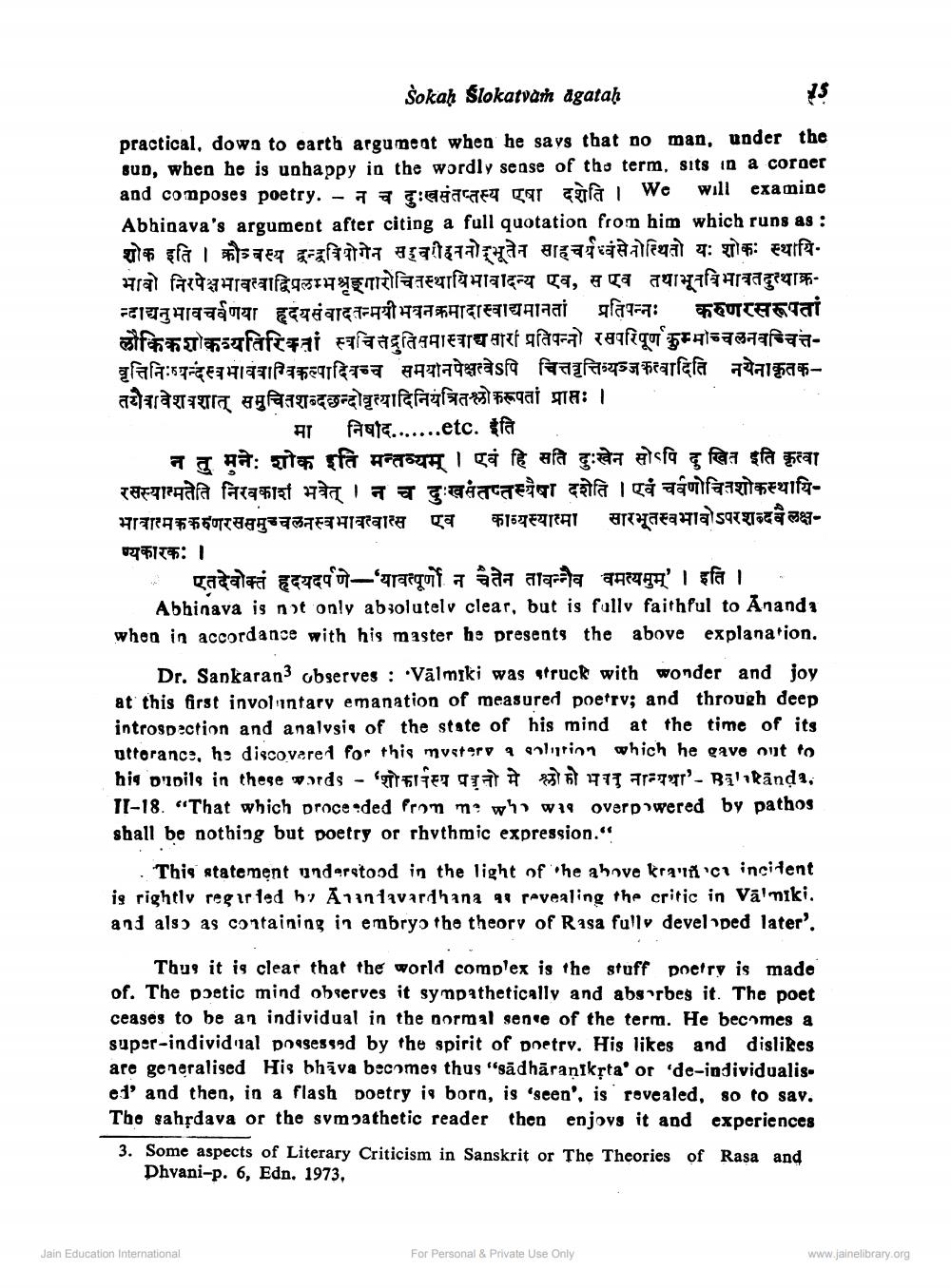________________
Sokaḥ ślokatvath agataḥ
practical, down to earth argument when he says that no man, under the BUD, when he is unhappy in the wordly sease of the term, sits in a corner and composes poetry. - न च दुःखसंतप्तस्य एषा दशेति । We will examine Abhinava's argument after citing a full quotation from him which runs as : शोक इति । क्रौञ्चस्य द्वन्द्ववियोगेन सहवरीहननोद्भूतेन साहचर्यध्वंसेनोस्थितो यः शोकः स्थायिभावो निरपेक्षभावत्वाद्विप्रलम्भश्रृङ्गारोचितस्थायिभावादन्य एव, स एव तथाभूतविभावतदुत्थाक्रन्दाद्यनुभावचर्वणया हृदयसंवादतन्मयीभवनक्रमादास्वाद्यमानतां प्रतिपन्न: करुणरसरूपता लौकिकशोकव्यतिरिकता स्वचित्तद्रुतिसमास्वाध सारा प्रतिपन्नो रसपरिपूर्ण कुम्मोच्चलनवञ्चित्तवृत्तिनिष्यन्दस्वभाववाग्विकल्पादिवच्च समयोनपेक्षत्वेऽपि चित्तवृत्तिव्यजकत्वादिति नयेनाकतकतयैवावेशवशात् समुचितशब्दछन्दोवृत्यादिनियंत्रितश्लोकरूपतां प्राप्तः ।
मा निषाद.......etc. ईति . न तु मने: शोक इति मन्तव्यम् । एवं हि सति दुःखेन सोऽपि दुखित इति कृत्वा रसस्यात्मतेति निरवकाशं भवेत् । न च दुःखसंतप्तस्यैषा दशेति । एवं चर्वणोचितशोकस्थायिभावात्मककरुणरससमुच्चलनस्वभावत्वात्स एव काव्यस्यात्मा सारभूतस्वभावोऽपरशब्दवैलक्षग्यकारकः ।
* एतदेवोक्तं हृदयदर्पणे-'यावत्पूर्णो न चैतेन तावन्नैव वमत्यमुम्' । इति । .
Abhinava is not only absolutelv clear, but is fully faithful to Ananda when in accordance with his master he presents the above explanation.
Dr. Sankaran3 observes : Vālmiki was struck with wonder and joy at this first invol'intary emanation of measured poetrv; and through deep introspection and analvsis of the state of his mind at the time of its uttorancs, ho discovered for this muster a colution which he gave out to hi Dibilk in these words - 'शोकास्य पवनो मे श्लोको भानु नान्यथा'- Barkanda, 11-18. “That which proceded from me who w 14 overpowered by pathos shall be nothing but poetry or rhythmic expression."
. This statement understood in the light of "he above tranci incident is rightly regir led h1 Arintavardhana he revealing the critic in Valmiki, and also as containing in embryo the theory of Rasa fully developed later'.
Thus it is clear that the world complex is the stuff poetry is made of. The poetic mind observes it sympathetically and absurbes it. The poet ceases to be an individual in the normal sense of the term. He becomes a super-individual possessed by the spirit of poetry. His likes and dislikes are generalised His bhiva becomes thus "sādharaniksta' or 'de-individualis. el' and then, in a flash poetry is born, is 'seen', is revealed, so to sav. The sahrdava or the sympathetic reader then enjoys it and experiences 3. Some aspects of Literary Criticism in Sanskrit or The Theories of Rasa and
Dhvani-p. 6, Edn. 1973,
Jain Education International
For Personal & Private Use Only
www.jainelibrary.org




